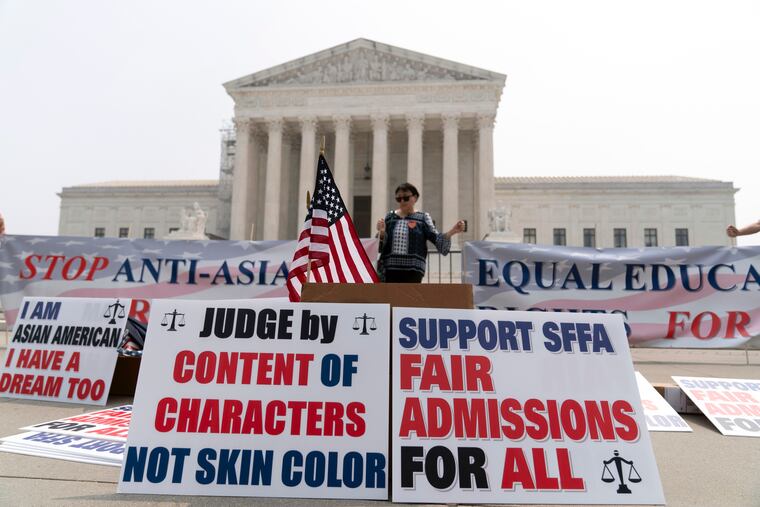Three reasons why conservatives should oppose legacy admissions
Any admissions decision based largely on an applicant’s bloodline — not character, accomplishments, and unique experiences — dehumanizes the applicant.

The U.S. Supreme Court’s decision earlier this summer in Students for Fair Admissions v. Harvard, outlawing affirmative action in college admissions, has ignited a long-overdue debate about legacy and donor preferences in university admissions. In recent weeks, some Republican lawmakers dove into the fray, expressing skepticism of legacy preferences, which give the children of alumni a leg up when applying, while many conservative thought leaders and influencers remain silent.
I am a conservative, Black and Japanese, first-generation graduate of an Ivy League school (Penn), and in my opinion, the silence from many on this topic is deafening.
People who are serious about empowering underrepresented groups and underprivileged communities should use the resources at their disposal to eradicate legacy and donor admissions preferences because they are fundamentally at odds with continued American prosperity and our values as a nation — including conservative values.
First, legacy and donor preferences promote the creation of a caste-like system, entrenching existing power structures by erecting unnecessary barriers to the advancement of exceptionally talented “have-nots” in our communities. And these barriers are not abstract or hypothetical. As the court stated in Students for Fair Admissions, college admissions are “zero-sum” and therefore a “benefit provided to some applicants but not to others necessarily advantages the former group at the expense of the latter.”
The displacement of some of our most talented young people by legacy and donor preferences is an obstacle to the emergence of the “natural aristocracy” — a term coined by Thomas Jefferson in 1813 to describe leaders who are exceptional people of virtue and talent, who achieved positions of influence because of who they are, not who their parents are.
As modern-day conservatives embrace Jefferson’s views of states’ rights and limited government, they should also consider his ruminations about the composition of a truly deserving and extraordinary group of political elite.
Second, legacy and donor preferences dehumanize our young people and send them the wrong message about the path to prosperity. Any admissions decision based largely on an applicant’s bloodline — not character, accomplishments, and unique experiences — dehumanizes the applicant, reducing them to the sum of their parents’ and grandparents’ resources and accomplishments, or lack thereof.
In doing so, it assigns the applicant an identity over which he or she has no control and communicates that the road to continued success in life is paved for the well-to-do, but will remain rocky for those who, through no fault of their own, end up on the wrong side of the tracks.
As conservatives, we should not stand by idly as legacy and donor programs dehumanize our young people, and in doing so, teach them that something other than hard work and character is the secret to success.
Third, by fighting to eradicate legacy and donor preferences, conservatives can demonstrate a seriousness of purpose in their quest to empower all Americans, with a vision rooted in Christian principles and values. While “culture wars” seem to be inevitable in America today, conservatives can carefully select battles worth fighting, with an eye toward uplifting the downtrodden and empowering the underprivileged.
Instead of using “freedom” as our only clarion call, we can adopt, in both word and deed, the biblical concept of “grace and truth” (John 1:14) in how we wage culture wars.
The truth of the matter is that while legacy and donor preferences may help universities fund their operations — and, in some instances, line the coffers of multibillion-dollar endowments — they indisputably stifle the advancement of many of our young people, displacing some of the best and brightest from our finest institutions.
I am the proud father of two sons. It is my hope that if they reap the rewards of an Ivy League education, their admission does not come at the cost of a school like Penn unfairly limiting its ability to take a chance on candidates like their father. I had no familial ties to the institution, but benefited so much from the education I received at Penn’s law school.
Penn has appeared to change its stance on legacy undergraduate admissions. Recently, Penn has amended the “Early Decision” section of its undergraduate admissions webpage to say: “Legacies who apply to Penn — like all applicants — receive thorough consideration in the application process.” Before, the language read: “An applicant’s affiliation with Penn, either by being a child or grandchild of alumni, is given the most consideration through Early Decision.”
A stronger stance, however, would be an unequivocal declaration that legacy status is not considered in admissions decisions, period. Such a policy could pave the way for the creation of a student body composed of more extraordinary individuals from humble beginnings — like Penn’s founder, Benjamin Franklin.
Principled conservatives should do their part to urge the esteemed institutions that serve as gateways to American prosperity to lay to rest practices like legacy and donor admissions that narrow the path to success for many of our most promising young people.
Kenji M. Price is a former United States attorney, former Army Ranger (75th Ranger Regiment), and a graduate of the University of Pennsylvania Carey Law School, where he served as editor in chief of the University of Pennsylvania Law Review.